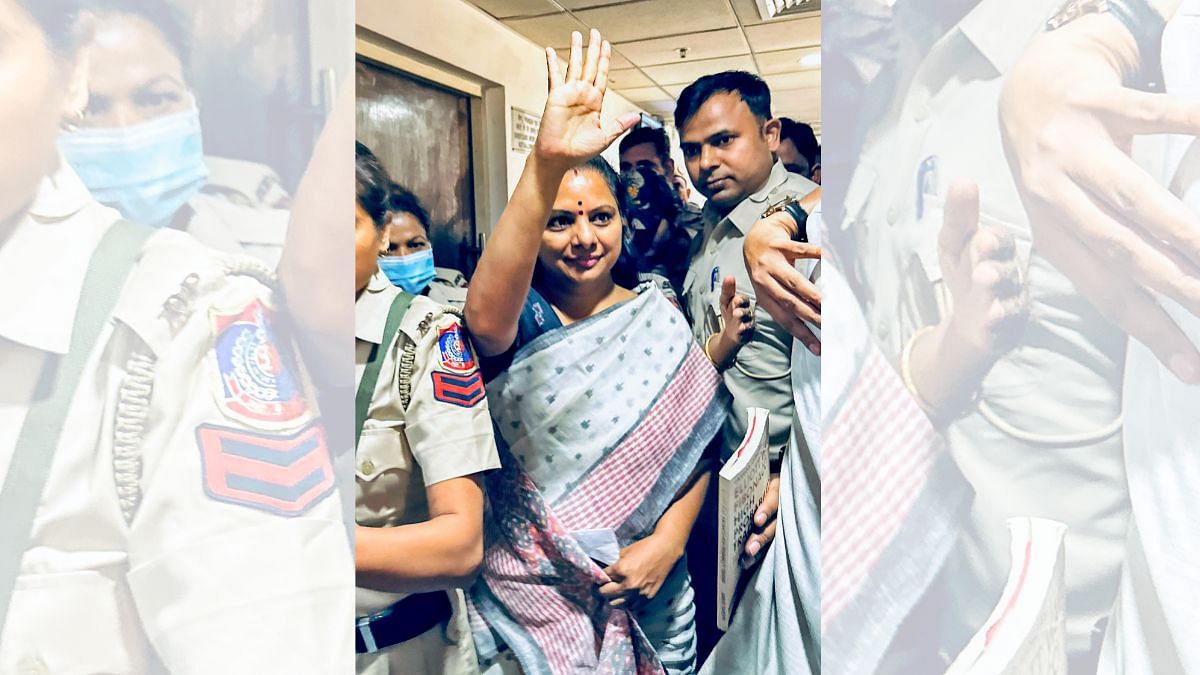New Delhi: The Rouse Avenue Court of Delhi on Friday sent Bharat Rashtra Samithi (BRS) leader K Kavitha to three days of CBI remand in connection with the excise policy case. The CBI had sought five days of custodial remand for her in the case.
The Special Judge, Kaveri Baweja, after hearing both sides in detail, decided to send her to CBI remand till April 15.
The BRS leader and daughter of former Telangana chief minister K Chandrashekar Rao, was arrested by the CBI while she was in judicial custody in the ED case.
The CBI remand application stated that “Kavitha Kalvakuntla was required to be arrested in the instant case to conduct her custodial interrogation for confronting her with the evidence and witnesses to unearth the larger conspiracy hatched among the accused/suspect persons regarding the formulation and implementation of the Excise Policy, as well as to establish the money trail of ill-gotten money generated and to establish the role of other accused/suspect persons, including public servants, as well as to unearth the facts which are in her exclusive knowledge.”
One of the companies under Aurbindo Group in July 2021 made a total payment of Rs 14 crore through a bank account transaction, in which Rs 7 crore was paid on the first week of July 2021 and the rest Rs 7 crore was paid in mid-November 2021, said CBI to Court while seeking custodial remand of K Kavitha.
It has been further revealed that in November-December 2021, Kavitha asked Sarath Chandra Reddy to pay Rs 25 crore at the rate of Rs 5 crore per zone as decided earlier for the five retail zones allotted to him, as she had claimed that she herself had paid Rs 100 crore as upfront money on our behalf to Aam Aadmi Party through the accused Vijay Nair for getting favourable provisions in the excise policy and also pursued the same through her associates Arun R Pillai and Abhishek Boinpally.
However, when Sarath Chandra Reddy showed his reluctance to pay the demanded money, Kavitha threatened Sarath Chandra Reddy to harm his business in Telengana and in Delhi under the Excise Policy, stated the remand application.
According to the Central Bureau Investigation, Sarath Chandra Reddy has also stated that when the Delhi Excise Policy was withdrawn on August 31, 2022, the accused, Arun R Pillai, an associate of Kavitha, told him not to pay the outstanding Indospirits for his retail zones.
“Subsequently, the investigation into the Delhi Excise Policy matter started and thereafter, Arun R Pillai did not contact him in this regard,” the CBI stated.
Appearing for Kavitha, Senior Advocate Vikram Chaudhari, along with Advocates Nitesh Rana, Mohit Rao and Deepak Nagar, opposed the remand application moved by CBI and submitted that the arrest has been made without any approval, permission or imprimatur of the Court, and the same can never qualify the test of law.
“K Kavitha was lying in custody in the PMLA case. This Court is exercising distinct jurisdiction in the capacity of Special Judge (PMLA) vis-a-vis Special Judge (CBI). Both jurisdictions cannot overlap and the CBI cannot use them to violate the procedures established by law,” the lawyers submitted.
Defence lawyers further submitted that the applicant (K Kavitha) is a sitting MLC in Telangana and is a renowned as well as mass popular leader of a national political party.
“The Lok Sabha Polls in the State of Telangana are scheduled to commence shortly and the entire exercise of arrest, especially the mode, manner and timing thereof, gives rise to the legitimate bona fide belief that the same is obliquely motivated at the behest of certain vested interests solely aimed at denying the level playing field in the realm of elections to a formidable opposition party. Rather, a more worrisome feature is that the investigations are neither free nor fair, impartial or unbiased, thereby rendering the rule of law a casualty,” they submitted.
The ED arrested Kavitha on March 15 this year in the case of the alleged liquor policy scam.
The CBI inquiry was recommended based on the findings of the Delhi Chief Secretary’s report filed in July, showing prima facie violations of the GNCTD Act 1991, Transaction of Business Rules (ToBR)-1993, Delhi Excise Act-2009, and Delhi Excise Rules-2010, officials said.
The ED and the CBI had alleged that irregularities were committed while modifying the excise policy, undue favours were extended to licence holders, the licence fee was waived or reduced and the L-1 licence was extended without the competent authority’s approval. The beneficiaries diverted “illegal” gains to the accused officials and made false entries in their books of account to evade detection, the probe agencies said.
As per allegations, the Excise Department had decided to refund the earnest money deposit of about Rs 30 crore to a successful tenderer against the set rules. Even though there was no enabling provision, a waiver on tendered licence fees was allowed from December 28, 2021, to January 27, 2022, due to COVID-19, the probe agency said and there was an alleged loss of Rs 144.36 crore to the exchequer.
Also read: SC flags social media posts ‘undermining court’s authority’, summons Assam MLA for contempt

